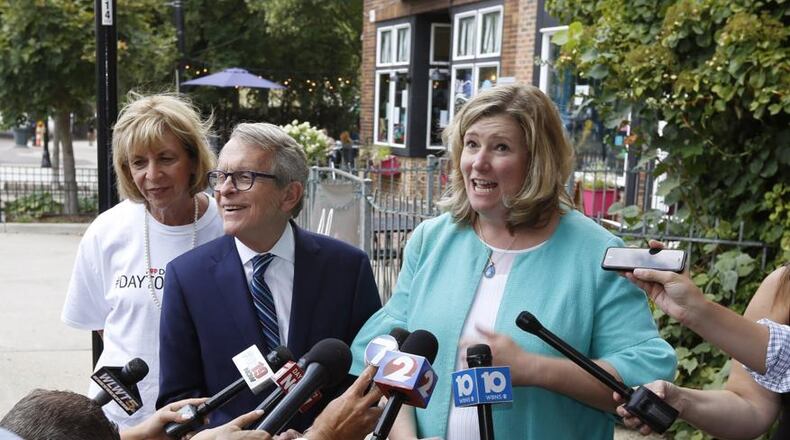LIVE - I am honored to accept the Democratic nomination for the office of governor alongside my running mate Cheryl Stephens. As two women from the working class, we are ready to shake up the status quo and root out the corruption that has run rampant at the Statehouse under Republican leadership for the last thirty years. It’s time to take back Ohio for the working class.
Posted by Nan Whaley on Tuesday, May 3, 2022
DeWine held a victory party at his Cedarville home, posting his comments on his campaign Twitter account.
“We’ve made promises and we’ve kept promises. We are ensuring that every child in Ohio can live up to their God-given potential,” he said.
DeWine pledged to increase police funding and support people struggling with addiction.
“Every Ohioan, regardless of their Zip code, deserves the chance to get a good-paying job, to raise a family comfortably, to be secure in their future, and to live their version of the American Dream,” he said.
Credit: Jim Noelker
Credit: Jim Noelker
DeWine’s campaign noted that shortly before 10 p.m., he had received more votes than Cranley and Whaley combined. He retains Lt. Gov. Jon Husted as his running mate.
Coming in behind DeWine were former U.S. Rep. Jim Renacci with 28%, then farmer Joe Blystone with nearly 22%, and former state Rep. Ron Hood with about 2%.
Speaking from Dayton shortly after 9 p.m., Whaley hailed her victory as a historic moment.
“A woman has never been nominated for governor in the state of Ohio, and you all just changed that,” she said. Her running mate is Cheryl Stephens, president of Cuyahoga County Council.
Credit: Jim Noelker
Credit: Jim Noelker
Whaley quickly thanked her primary opponent, former Cincinnati Mayor John Cranley, who conceded the race before 10 p.m.
“This has been a hard-fought campaign, but I genuinely appreciate his ideas and plans and I look forward to working with him over the next six months,” she said.
Whaley immediately launched a fierce attack on DeWine.
“The fact of the matter is, Mike DeWine is out of touch, corrupt, and doesn’t care about you,” she said, noting that DeWine has held public office almost since she was born.
In that time conditions declined for Ohio families while DeWine grew rich in office, Whaley said. In contrast, she touted her middle-class background.
Whaley blasted DeWine over scandal-ridden House Bill 6, saying utility company FirstEnergy spent “millions of dollars” to get him elected governor.
“In return, he gave them everything they wanted,” she said.
Whaley pointed to DeWine’s signature on bills loosening gun laws, and — referring to the impending potential overturn of Roe v. Wade — predicted that abortion will be criminalized in Ohio if he is reelected.
She reached out to the supporters of DeWine’s primary opponents, saying they wouldn’t agree on many issues but “can unite to send the corrupt establishment a message they can’t ignore.”
DeWine, 75, was born in Springfield and now has a home in Cedarville. After attending Miami University of Ohio and Ohio Northern University’s law school, he worked as an assistant prosecutor in Greene County until his 1976 election as county prosecutor.
Elected to the Ohio Senate in 1980, he served only until 1982 when he was elected to the U.S. House district southwest of Cleveland and Akron. DeWine held that seat until 1991, when he was elected lieutenant governor under Gov. George Voinovich.
DeWine resigned that office on his 1994 election to the U.S. Senate. He was reelected senator in 2000 but in 2006 lost to Democratic Sen. Sherrod Brown.
Elected Ohio attorney general in 2010, DeWine held that position until his 2018 election as governor.
Originally from Mooresville, Indiana, Whaley graduated from the University of Dayton and Wright State University, finishing her Master’s degree in public administration from the latter in 2009.
She served in several public capacities before and during her terms in Dayton city government, such as executive director of the Montgomery County Democratic Party and a four-time delegate to the Democratic National Convention.
Whaley served two four-year terms as a Dayton city commissioner before being elected mayor in 2013 and reelected in 2017. She was president of the U.S. Conference of Mayors during her last year as Dayton’s mayor. She planned to run for governor in 2018 but dropped out and endorsed Richard Cordray, the eventual Democratic nominee.
About the Author

